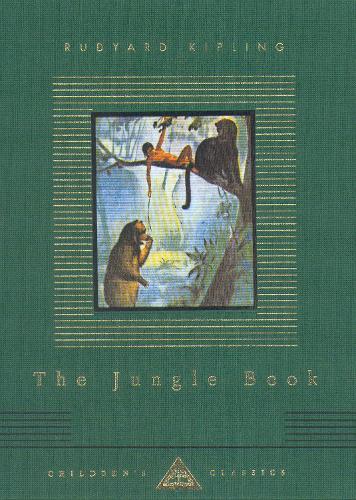
The Jungle Book
(Hardback)
Available Formats
Hardback
Published: 25th November 1994
Paperback
Published: 1st May 2009
Board book, Adapted edition
Published: 20th October 2020
Paperback
Published: 1st August 2012
Hardback
Published: 29th July 2015
Hardback
Published: 1st December 2014
Paperback
Published: 5th July 2018
Hardback
Published: 1st November 2015
Hardback
Published: 1st September 2016
Paperback
Published: 23rd July 2018
Hardback
Published: 1st September 2006
Hardback
Published: 1st November 2022
Paperback
Published: 13th May 2025
Hardback
Published: 21st March 2016
Paperback
Published: 10th October 2014
Hardback
Published: 26th July 2016
Hardback
Published: 1st November 2015
Hardback, New edition
Published: 31st March 2021
Paperback
Published: 15th August 2021
Paperback
Published: 4th May 2009
Publishing Details
The Jungle Book
By (Author) Rudyard Kipling
Everyman
Everyman's Library Children's Classics
25th November 1994
6th October 1994
United Kingdom
Classifications
Children
Fiction
823.8
Physical Properties
Hardback
272
Width 163mm, Height 211mm, Spine 20mm
483g
Description
Among the best loved of all classics for children are the tales of Mowgli, the boy who learned the law of the jungle as he grew up among a pack of wolves in India's Seeonee Hills. First published in 1894, the book imagines a child living and flourishing in a community of animals - an idea that perhaps had its origin in Kipling's unhappy childhood. 'His stories are not animal stories in the realistic sense; they are wonderful, beautiful fairy tales, ' wrote Ernest Thompson Seton, the great Canadian naturalist. Kurt Wiese's illustrations, commissoned by the American firm of Doubleday in 1932, have never appeared in Britain before. An artist with a particular interest in animals and an amazing visual memory, he remembered all he had observed on his travels in the Far East during the early 1900s, first as a salesman in China and then as a prisoner-of-war of the Japanese.
Author Bio
Rudyard Kipling was born in Bombay in India in 1865 to British parents, and brought up by a Portuguese ayah (nanny) and an Indian servant, who would entertain him with fabulous stories and Indian nursery rhymes. He was sent back to England when he was seven years old, and lived in a boarding house with a couple who were cruelly strict. Fortunately he returned to India aged sixteen, to work as the assistant editor of a newspaper in Lahore. He began publishing stories and poems and eventually had great success with his book Plain Tales from the Hills. After his marriage Kipling settled in America, and it was here that he wrote The Jungle Book. He then moved with his family to England, where he wrote Just So Stories for his daughter Josephine who later tragically died of pneumonia. Rudyard Kipling was awarded the Nobel Prize for Literature in 1907 and died on 18 January 1936.
